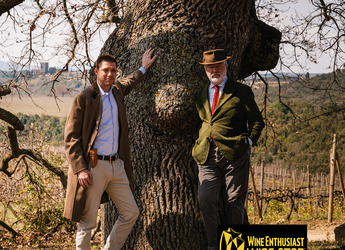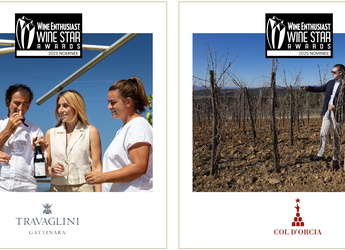
Recanati World-Class Wines from Israel

Cultivating Israel’s ancient wine culture into thoroughly modern expressions of the country’s extraordinary, high-altitude terroir was the dream — one that Lenny Recanati and Uri Shaked realized in spectacular fashion with the founding of their Recanti winery in the year 2000.
In the beginning, they would spend harvest after harvest analyzing the growth and quality potential of all the classic international varieties (cabernet sauvignon, merlot, and sauvignon blanc), examining and identifying the best growing areas that could fully capture the trademark Israeli wine nuance. But after a few years — Lenny tells us it was during a particularly chilly night harvest in 2007 — a bolt of inspiration struck.
Why not marry the classic with the indigenous and focus production on a new kind of blend? It kickstarted a Mediterranean viticultural revolution — and Recanati was a major player, thanks to its hugely successful wild carignan. Then along came another breakthrough: wine produced from the ancient marawi grape, growing wild in a very special vineyard on the winery’s property.
Today, Recanati sits at the forefront of the Israeli wine scene, in relentless pursuit of excellence driven by fearless innovation.
Recanati Highlights
Israel is one of the world’s most intriguing territories for viticulture, with an array of microclimates and incredible terroir.
Recanati has been at the forefront of Israel’s modern wine revolution since 2000, marrying international grapes with ancient, indigenous varieties.
Inspired by the wildflowers depicted in many ancient carvings and mosaics found in the Galilee region, the Recanati logo represents the rebirth of winemaking traditions with the establishment of the modern state of Israel in their ancient homeland.
For nearly a decade, Recanati has been the only Israeli winery to be invited to Wine Spectator’s New York Wine Experience, joining ranks with the top 250 wineries in the world.
Year after year, Recanati earns myriad 90+ point scores and top critical acclaim.

-
Founded
2000 -
Location
Merom Ha'Galil, Upper Galilee, Israel -
Follow On
Ancient Traditions
Wine has been produced in Israel for over 5,000 years — since the beginning of recorded time. Ancient winemakers grew grapes on terraces, made wine in low-lying limestone presses, and stored it in amphorae in cool caves. Renowned for their superior quality, these wines were exported across the world, until the Muslim conquest of Levant more than 1,300 years ago forced winemaking to be abandoned.
Today, quality-focused producers have revived Israeli’s winemaking tradition, assisted by modern technologies. More than 350 wineries call Israel home (compared to just 12 in 1989), and the country produces over 45 million bottles per year. Led by pioneering estates like Recanati winery, Israel’s modern wine style blends Old World elegance with the essence of New World fruit.

Terroir
How do you make balanced wines in a desert? You go as far north as you can and plant on the highest altitudes possible. And the Recanati winery cultivates vineyards in three of the best the high-altitude enclaves: the Upper Galilee, Golan Heights, and the Judean Hills.
Upper Galilee’s Mediterranean climate is well-suited to growing a variety of grapes — the Recanati winery cultivates cabernet sauvignon, merlot, chardonnay, sauvignon blanc, shiraz, marselan, and more here. High altitudes and cool breezes produce fresh aromatics and the wide diurnal temperature ranges extend the ripening period.
The Golan Heights lies on a basaltic plateau with vineyards planted between 396 to 1,188 meters / 1,300 to 3,900 feet. The altitude, combined with the deep, rich clay soils, results in more elegant, complex characteristics in the marselan variety.
The Judean Hills’ vineyard elevation ranges between 365 to 731 meters / 1,200 to 2,400 feet, with shallow, well-draining soils rich in minerals — the wines show a unique elegance, spiciness, and minerality. Here, Recanati grows wild carignan, alongside bittuni and marawi, Biblical varieties the winery reintroduced to the world.

Viticulture
Preserving Israel’s native varieties is a top priority for the Recanati winery. Using fertigation or “plant monitoring” technology (developed in Israel) they precisely determine each vine’s individual needs. The vineyard team uses specialized software to integrate climatic data with measurements of soil moisture, water uptake, leaf evaporation, shoot growth, and berry development. This allows the team to provide the vines with exactly the exact amount of water and nutrients they need. By keeping the vines moderately stressed, they produce lower yields of more concentrated fruit.
Recanati also conducts continuous research into the diverse microterroirs of Israel to determine the best sites for growing different grape varieties. Likewise, the team has partnered with Bar-Ilan University in Tel Aviv to identify 12 native Israeli grape varieties (so far, that is). These include the rare bittuni and marawi grapes, which ancient winemakers cultivated in Biblical times.

Crafted by Chief Winemaker Kobi Arviv
Kobi Arviv gradually learned the ins and outs of the wine world on his own and began his career at Recanati winery in 2006. Five years later, he was appointed winemaker. Talented and creative, Kobi has become one of Israel’s best winemakers. He has a passion for matching Mediterranean grape varieties to the Israeli climate and is helping take Recanati wines to new heights of quality.









